- Home
- Margaret Atwood
Life Before Man Page 15
Life Before Man Read online
Page 15
Don't call him love, Lesje felt like saying. You can't fool me. But she supposed it was a habit. After all, they've been married for ten years.
Which Elizabeth has taken care to emphasize. There have been references all evening to Nate's favorite foods and Nate's favorite wines and Nate's peculiarities of dress. Elizabeth wishes he would get the back of his hair trimmed more often; she used to do it herself with the nail scissors, but she can't get him to hold still long enough any more. Nate's behavior on their wedding day has been mentioned, though not explained; everyone in the room, including the Greek and Roman couple, seems to know this story. Except Lesje and, of course, William, who was in the bathroom at the time. Where Lesje herself at this moment fervently wishes she could be.
William has produced his pipe, an affectation he by and large reserves for company. "I know a better one," he says. "Ever played Star Trek?" But nobody has, and the rules, as William starts to expound them, are pronounced too complicated.
"Lifeboat," says the Greek and Roman woman.
Nate asks if anyone would like more B & B. He himself is going to pour himself a Scotch. Would anyone care to join him?
"Sensational," says Elizabeth. She explains that this game is very simple. "We are all in a lifeboat," she says, "and the food is running out. What you have to do is convince everyone else why you should be allowed to remain in the lifeboat instead of being thrown overboard." She says that this game is often very revealing psychologically.
"I sacrifice myself for the good of the group," Nate says promptly.
"Oh," Elizabeth says, giving a mock frown. "He always does that. It's his Quaker upbringing. Really it means he can't be bothered."
"Unitarian," say Nate. "I just think it's an unduly vicious game."
"That's why it's called Lifeboat," Elizabeth says lightly. "All right, Nate's overboard. The sharks have him. Who wants to begin?"
No one does, so Elizabeth tears up a paper napkin and they draw lots.
"Well," says the Greek and Roman man. "I know Morse code. I can help us get rescued. And I'm good with my hands. When we land on the desert island, I can build the shelter and so forth. I'm a pretty good plumber, too. A tool man." He smiles. "It's nice to have a man around the house."
Elizabeth and the CBC woman, laughing, agree that he should be allowed to stay on the boat.
Elizabeth is next. "I'm a sensational cook," she says. "But more than that, I have a very strong survival instinct. If you try to push me overboard, I'll take at least one of you down with me. How's that? I don't think we should be kicking people out of this boat anyway," she adds. "We should be saving them and eating them. Let's drag Nate back in."
"I'm already miles away," Nate says.
"Elizabeth's using threats," the CBC woman says. "Any of us could use the same ploy; I don't think it should count. But if we're thinking of a long-term plan, I propose that I should be saved instead of Elizabeth. She's almost past child-bearing age and if we want to establish a colony, we'll need babies."
Elizabeth goes white. "I'm sure I could still squeeze a few out," she says.
"Not many," the CBC woman says brightly. "Come on, Liz, it's only a game."
"Lesje?" Elizabeth says. "You walk the plank next."
Lesje opens her mouth, then closes it. She can feel herself blushing. She knows this is not just a game, it's a challenge of some sort. But still, she can't think of a single reason why she should be permitted to remain alive. She isn't a good cook, and besides there's nothing much to cook. She can't build shelters. The CBC woman has used up the babies, and anyway Lesje has a narrow pelvis. What is she good for? None of the things she knows, knows well, is in any way necessary for survival.
They are all looking at her, embarrassed now by the length of time it's taking her, her obvious confusion. "If we find any bones," she says at last, "I'll be able to tell you whose they are." As if the history of bones matters, to anyone but her and a few other addicts. She's attempted a sort of joke, but it's hardly witty repartee. "Excuse me," she says, her voice a whisper. Carefully she sets down her cup, then her glass, on the beige rug. She stands up and turns, catching the cup with the side of her foot, and bolts from the room.
"I'll get a cloth," she hears Nate saying.
She locks herself into Elizabeth's bathroom and washes her hands with Elizabeth's peculiar brown soap. Then she sits, closes her eyes, elbows on her crossed knees, hands covering her mouth. The B & B must be getting to her. Is she really this graceless, this worthless? From her treetop she watches an Ornithomimus, large-eyed, bird-like, run through the scrub, chasing a small protomammal. How many years to learn to grow hair, to bear young alive, to nurture them? How many for the four-chambered heart? Surely these things are important, surely her knowledge should not perish with her. She must be allowed to continue her investigations, here in this forest of early conifers and pineapple-trunked cycad trees.
Everyone has a certain number of bones, she thinks, clutching for lucidity. Not their own but someone else's and the bones have to be named, you have to know what to call them, otherwise what are they, they're lost, cut adrift from their own meanings, they may as well not have been saved for you. You can't name them all, there are too many, the world is full of them, it's made of them, so you have to choose which ones. Everything that's gone before has left its bones for you and you'll leave yours in turn.
This is her knowledge, her field they call it. And it is like a field, you can walk through it and around it and say: These are the boundaries. She knows why the dinosaurs do many of the things they do, and about the rest she can deduce, make educated guesses. But north of the field history begins and the fog takes over. It's like being far-sighted, the distant lake and its beaches and smooth-backed basking sauropods clear-edged in the moonlight, her own hand a blur. She does not know, for instance, why she is crying.
Saturday, January 22, 1977
ELIZABETH
Elizabeth is lying in bed, arms at her sides, feet together. The weak light from the street lamps comes in stripes through the bamboo blind, falls in bars on the walls, broken by the shadow of the spider plants, curved fingers which do not hold or reach for anything. The window is open a little at the bottom, the wooden slat covering the three holes in the sash of the storm window is lifted, cold air sifts through. Elizabeth opened it before she went to bed, she needed air.
Elizabeth lies with her eyes open. In the kitchen below her, Nate moves dishes. She notes him, pushes him back. She can see up through the dark ceiling, through the joists and layers of plaster and the worn linoleum, blue squares, which she, slovenly landlady, should have replaced long ago, past the beds where the tenants lie asleep, a mother, a father, a child, a family, up through the pink ceiling of their room and out through the rafters and the patched and leaking roof to the air, the sky, the place where there is nothing between her and nothing. The stars in their envelopes of bright gas burn on. Space no longer frightens her. She knows it is uninhabited.
Where did you go? I know you aren't in that box. The Greeks collected all the pieces of the body; otherwise the soul could not get away from the upper earth. To the happy islands. Philip said that tonight, between the boeuf bourguignon and the meringue with chocolate ginger sauce. Then he changed the subject, he remembered and was embarrassed, he knew he shouldn't be talking about funerary customs. I smiled, I smiled. It was a closed coffin, naturally. They shipped him north in dry ice, rigid among the cold crystals, fog coming off him like a Dracula movie. Tonight I thought, they forgot something. Part of him has been left behind.
She could not move; nevertheless she had Nate take her to the train in a taxi, where she sat like a slab of rock all the way to Thunder Bay and then on the unspeakable bus. English River. Upsala on one side, Bonheur on the other, Osaquan up the road. He used to point out those names, and the irony, the indignity of having been born and forced to live in English River. "The English," they still said, Scots, French, Indians, what-have-you. The enemy, the despoile
rs. She was one of the English.
She sat in the back pew, kneeling when the others kneeled, standing when they stood, while Chris, surrounded by meager flowers, underwent the ceremony. Luckily it was in English, she could follow it. They even said the Lord's Prayer, a slightly different version. Forgive us our trespasses. When she was young she used to think that meant walking on other people's property. A thing she never did; therefore she did not need to be forgiven. As we forgive those who trespass against us. Get off the lawn, Auntie Muriel used to shout at the running children, opening the front door, then closing it like a mouth behind her voice. The old priest turned towards the people, raising the cup, mumbling, distaste on his face. The Latin was better, you could tell he thought that.
They didn't bury him at a crossroads with a stake, though. Death by misadventure. The shoulders were bowed, the heads bent, his mother in black in the front pew, with a real veil. The other children - Elizabeth supposed that was who they were - lined up beside her.
Afterwards there was coffee at the house. The neighbors brought cookies. One of those small northern bungalows, on a rock, pink and blue like a cake, dark spruce trees all around. Skidoo parked in the shed, the Eaton's Catalogue furniture, the worn store drapes four inches too short. Everything was the way she'd known it would be. The father's carefully learned English, the mother's dark face, baggy with grief and starch. We wanted him to have a chance. He was doing good. Always a smart boy. An education, finished his Grade Twelve, a steady job. Elizabeth thinking: Bullshit. You drove him out. Hit him when he wouldn't turn into you; right in that shed. We told each other a lot.
The mother: You a friend of his? From the city, eh? Then, as she'd feared, throwing back the veil, the bad teeth showing, pushing her dark face towards Elizabeth, her hair turning to snakes: You killed him.
But she could never have made it as far as the train, the taxi even. Chris disappeared without her help or connivance. As far as she knows, his parents, if they still exist, have never heard of her. And her images are all wrong, too. He let on to her at first, hinted, that he was part Indian and part French, Metis, that mythical hybrid; archaic, indigenous, authentic as she was not, his sense of grievance fully earned. He sneered at her, the whiteness of her skin and presumably her blood, made love as if exacting payment, and she'd let herself be bullied. As she would otherwise have not. Then one afternoon, lying depleted on his smoky bed, they'd gone past that into the land of perilous confidences, her scrounging childhood, hunger and unbrushed hair behind her mother's helpless pretensions. Never envy anyone, she'd said, until you know. Now tell me.
It was twilight, drawn curtains, he rubbed his hand over and over her bare shoulder, for the first time he would give her something, give something away, he could hardly do it. It made her wince, that effort, it was not what she wanted. Don't ever drop your defenses, she should have told him; they're there to defend you.
He was only a quarter French, and no Indian at all. The rest was Finnish and English; his mother's name was Robertson. They weren't even poor enough to be romantic, they ran the cigar store, the good one, not the other. No trapper he. The beatings were real enough, but less frequent than he'd said. Was that when her attention had begun to slip, was she that cruel, that snobbish? Probably.
Despite this, she has not known what to answer to that mother's face looming like a moon, a moon seen close, cold and ravaged. No, she's said, more than once. It was malice, pride, it was his own damn fault. It wasn't me.
Now she finally wonders. What if? What if she'd left him alone. Foregone that jag, energy flowing into her. I wonder if you have some leftover fur scraps; my daughters make doll clothes out of them. To Chris, who had nothing left over, no reserves he could draw on, no free gifts to hand out. She'd known what she was doing. To be loved, to be hated also, to be the center. She had what he wanted, power over a certain part of the world: she knew how to behave, what fork to use, what went with what. He wanted that power. He had two ties, one green, one purple. Neither of them would do. He looked better in a T-shirt, she told him; which she should not have done.
She had that power and she'd let him see it and touch it. She let him see he was deficient and she promised, what? A transformation, a touch on the shoulder, knighthood. Then she'd stepped back, showing him that he was after all only a vacation, a beautiful picture on a brochure, a man in a loincloth whacking the head off some nondescript coconut. A dime a dozen. Leaving him naked.
She thinks: I treated him the way men treat women. A lot of men, a lot of women; but never me, not on your goddamned life. He couldn't take it. Does she feel pity for him at last, or is it contempt?
Downstairs Nate rattles the silverware, rinsing it, she knows, before putting it into the plastic basket in the dishwasher. She's heard this sound often enough. She turns her eyes away from the stars, looks instead down through the floor. Nate shuffles, cigarette stub in his mouth, lost in some melancholy dream. Mooning, yearning. She watched him this evening, through the dinner which she did not in the least enjoy, the parlor games, she could see it all, he's in love with that giraffe. Coffee on the rug, a minor irritation, she'll have to get it steam-cleaned; also a satisfaction. Lesje is a clown. But is, despite her gawkiness and lack of poise, a younger woman, quite a lot younger than Elizabeth. Elizabeth finds this banal. Tedious, predictable. However, Nate has been what everyone would call in love before. She'll give him permission, express interest, be helpful, wait it out. She's been through this before, she can do it with one hand tied behind her back.
(But why bother, another voice says. Why not let him go? Why make the effort?)
There's something else, she remembers now, and it's dangerous. Before, he wanted to be protected. He wanted a woman to be a door he could go through and shut behind him. Everything was fine as long as she was willing to pretend she was a cage, Nate a mouse, her heart pure cheese. He is, she knows, a hopeless sentimentalist. Earthmother, Nate her mole, snouting in darkness while she rocked him. I think that I shall never see a poem lovely as a tree. When she gave it up he found Martha, who could not do it nearly as well.
But this time he wants to protect. Looking down at the top of his head, the back of his neck, the way his hands move, deliberately, she knows it, even though he may not know it himself.
Elizabeth sits up in bed. Wires light in her legs and fingers, the walls with their shadows are in place again, the floor is there, the ceiling has healed over. Space is a cube around her, she is the center. There is something to be defended.
Stay in your place, Nate. I will not tolerate that void.
Saturday, January 22, 1977
NATE
Sadly, Nate stacks plates. It's the rule that when Elizabeth cooks, Nate does the dishes. One of the many rules, subrules, codicils, addenda, errata. Living with Elizabeth involves a maze of such legalities, no easier to understand because some of them are unspoken. Like an unwary pedestrian, he only realizes he's violated one of these when the bumper hits him, the whistle blows, the big hand descends. Ignorance of the law is no excuse. He imagines Lesje to be without rules.
He sees himself bending to whisper at the bathroom keyhole: I love you. Irrevocable commitment, even though he isn't sure whether Lesje, barricaded behind the bathroom door where she'd been for the past half-hour, could really hear him. He isn't sure why she was upset. He'd seen her face as she headed out the door. The coffee stain spreading on the rug behind her; but it wasn't that.
He'd wanted to reach through the bathroom door, comfort her, he thought about knocking, decided against it. What if she opened the door? If he said that to her face, no wall between, he would have to take action. Even though he meant it. He would find himself in mid-air, hurtled into a future he could not yet imagine, Elizabeth left on the solid earth behind him, feet on the ground where she always claimed they were, a dark hummock, the children's faces two pale ovals beside her. Receding from him.
He thinks of them (riotously bouncing at this moment on their friend Sarah's s
pare bed, in the dark, stifling laughter) and sees, not their daily faces, but two little portraits. In silver frames, birthday-party dresses, the dead hues of a black and white photo tinted. He and Elizabeth do not own any such portraits. His children immobilized, stilled. Bronzed. He tries to remember what it was like before they were born, finds he can't. He can only go as far back as Elizabeth, trundling through the days and finally climbing ponderously from the car which he'd bought months before for this occasion, doubling over against the hood; himself solicitous and frightened. They wouldn't let fathers into the delivery room in those days. He walked her to the desk; the nurse looked at him disapprovingly. See what you've done. He installed her in a ward room, sat as she clenched and unclenched, watched as she vanished down the corridor in a wheelchair. It was a long labor. He slouched in a chair covered with green vinyl, reading back copies of Sports Illustrated and Parents, feeling his mouth fog up. He wanted a drink badly and all they had was coffee from a machine. Behind doors an earthquake was taking place, a flood, a tornado that could rip his life apart in minutes, and he was shut out from it.
Around him machines wheezed; he dozed. He was supposed to feel anxious and happy, he knew. Instead he found himself wondering: What if they both die? The bereaved young father stood at the graveside, clogged with grief, as the woman once so vibrant and sensuous, who'd smelled of crushed ferns, descended forever into the earth, cradling a stillborn baby the color of suet. He walked down a road, any road, thumbing, heading for some legendary steamer, pack on his back. A broken man.

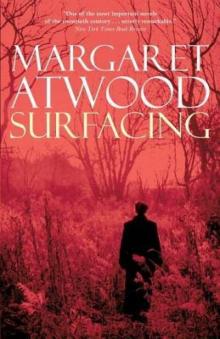 Surfacing
Surfacing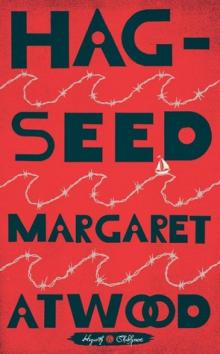 Hag-Seed
Hag-Seed Oryx and Crake
Oryx and Crake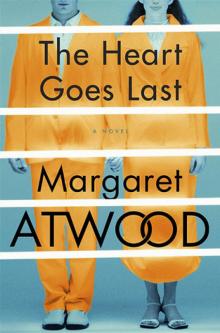 The Heart Goes Last
The Heart Goes Last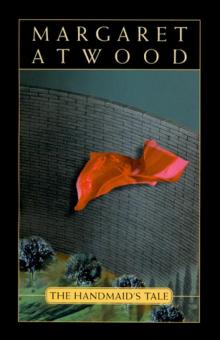 The Handmaid's Tale
The Handmaid's Tale Lady Oracle
Lady Oracle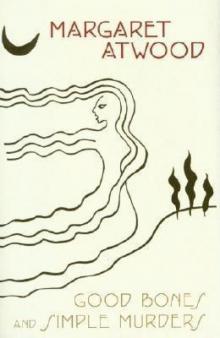 Good Bones and Simple Murders
Good Bones and Simple Murders The Robber Bride
The Robber Bride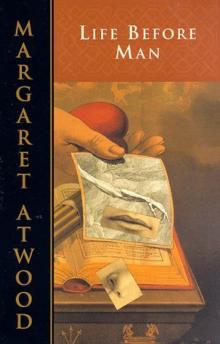 Life Before Man
Life Before Man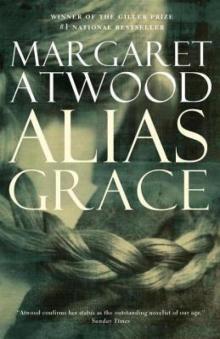 Alias Grace
Alias Grace The Blind Assassin
The Blind Assassin Cat's Eye
Cat's Eye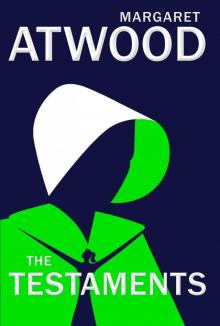 The Testaments
The Testaments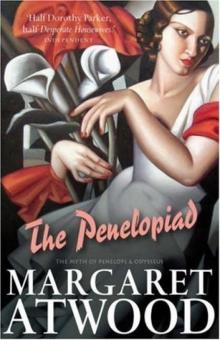 The Penelopiad
The Penelopiad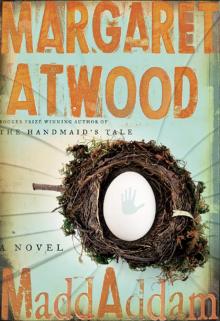 MaddAddam
MaddAddam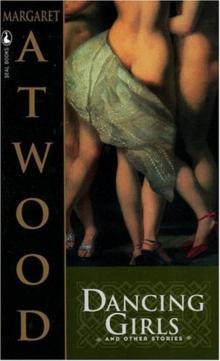 Dancing Girls & Other Stories
Dancing Girls & Other Stories On Writers and Writing
On Writers and Writing Selected Poems II (1976-1986)
Selected Poems II (1976-1986) Wilderness Tips
Wilderness Tips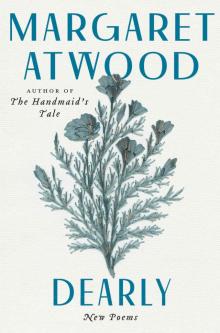 Dearly
Dearly The Tent
The Tent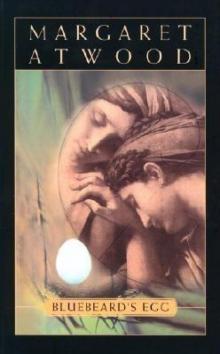 Bluebeard's Egg
Bluebeard's Egg The Edible Woman
The Edible Woman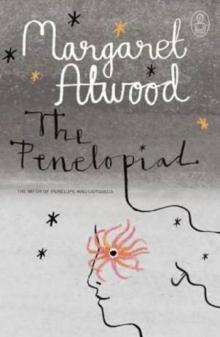 The Penelopiad: The Myth of Penelope and Odysseus
The Penelopiad: The Myth of Penelope and Odysseus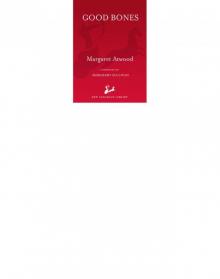 Good Bones
Good Bones I Dream of Zenia with the Bright Red Teeth
I Dream of Zenia with the Bright Red Teeth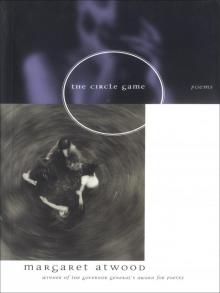 Circle Game
Circle Game Choke Collar: Positron, Episode Two
Choke Collar: Positron, Episode Two Stone Mattress: Nine Tales
Stone Mattress: Nine Tales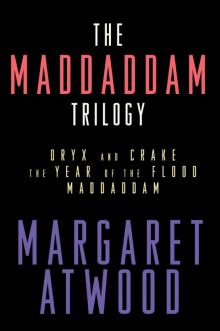 The MaddAddam Trilogy
The MaddAddam Trilogy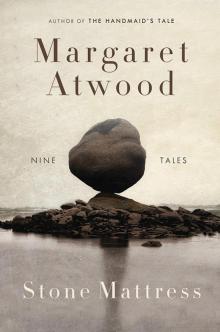 Stone Mattress
Stone Mattress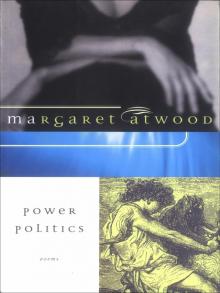 Power Politics
Power Politics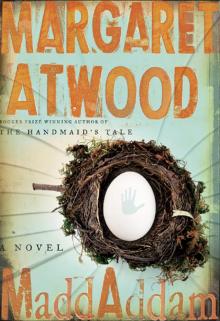 MaddAddam 03 - MaddAddam
MaddAddam 03 - MaddAddam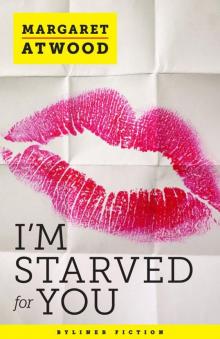 I’m Starved for You (Kindle Single)
I’m Starved for You (Kindle Single) Murder in the Dark
Murder in the Dark In Other Worlds
In Other Worlds Dancing Girls
Dancing Girls Moral Disorder
Moral Disorder